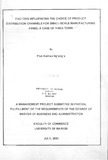| dc.description.abstract | This study sought to investigate the nature of distribution channels for small- scale manufacturing firms in Thika town and the factors, which influence the choice of these channels. This research was a descriptive study involving 60 firms. A semi- structured questionnaire was used to collect the relevant data, while frequency tables, means, percentages and average ratings were used to summarize the findings and draw conclusions. The chi-square test of association was also used to test for the relationship between the type of distribution channels selected by the firms and the various factors, which influenced the choice of these channels.
The results of the study revealed that most firms commonly used direct distribution channels (61.7%), while only 38.3% of the firms used indirect distribution channels, which included mixed/dual channels of distribution. Among the factors that were most frequently mentioned as influencing selection of distribution channels included middlemen requirements, their availability and their profit margin expectations. Further, customer order sizes, nature of product demand and the location of customers were identified as important factors. The least frequently mentioned factors included distribution methods used by competitors and the type of customers served. The results of the chi-square test of association revealed that a significant relationship existed between the type of distribution channels selected by
the firms and the profit margin expected by middlemen, the nature of demand for the
-
firms' products and the size of customer orders. Conversely, no significant
relationship was established' between the type of distribution channel selected and the sub-sector of the firm, the length of time in, business of the firm, the width of the firms' product line and the type of customers served by the firm.
In conclusion, these findings have important managerial implications for small- scale firm operators and other stakeholders intent to assist SSEs to distribute their
vii
products more effectively. One important managerial implication is that there are high costs to making an incorrect channel decision. This is because once a channel decision is made, (whether right or wrong) it tends to be reinforced over time as new products are sold through these established channels. Thus, if the wrong channel is selected, high costs of changing the channel may face the firm. Therefore, SSEs will need to carefully consider the factors, which have been identified as influencing channel selection decisions in their attempts to make decisions regarding the distribution of their products. For instance, this study has revealed that the existence of demand for relatively small and large order sizes in served markets for SSEs may justify the selection of alternative channels for the same market as a strategic productdistribution option. In essence therefore, if end customers are willing to buy
in large quantities, the firms should aim at serving them directly. Otherwise, it would be more economical to serve them through channel intermediaries.
Finally in terms of public policy, it is recommended that the Goyernment of
Kenya develops low-cost and affordable business training programs to equip small- scale operators with the knowledge and skills to make optimal decisions regarding the distribution of their products .and on how to chose and retain the right intermediaries for their products. | en |

